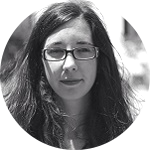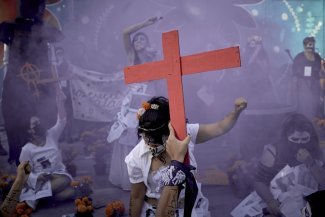
Journalists, activists and talk show hosts have all become the new targets of Lebanese authorities. Accused and prosecuted on charges of defamation, they don’t risk actual prison sentences as the charges are usually dropped after a while. However, the charges symbolise the pressure that the government wants to put on free speech ahead of parliamentary elections on 6 May 2018.
“Legal attacks against journalists and activists have significantly increased these past two years, and especially since November 2017,” Ayman Mhanna, executive director of the Samir Kassir Foundation, tells Equal Times. “In 2017, we counted 20 attacks: three in October, six in November and three in December. Already, we had ten in January 2018, and three more on the first week of February.”
Amongst the most recent cases, LBCI talk show host Marcel Ghanem was charged in January with contempt and obstruction of justice after failing to appear to an initial summons in November. On 10 November 2017, he had invited two Saudi journalists who criticised the Lebanese government on his weekly talk show Kalam Ennas (meaning Talk of the People in English). Ghanem was then prosecuted before being released on bail on 16 February.
On 18 January, Hanin Ghaddar, the inaugural Friedmann Visiting Fellow at The Washington Institute and former editor of NOW Media, was sentenced to six months in jail in abstentia [she left the country] by a military court. She was charged with “defaming” Lebanon’s armed forces during a 2014 conference in the United States.
Another LBCI talk show host, Hisham Haddad, was also prosecuted on 25 January for making jokes about Saudi Arabia’s Crown Prince Mohammad bin Salman and Lebanon’s Prime Minister Saad Hariri on his weekly show Lahonwbas (which roughly translates as “Ok, we’ve had enough” in English).
Five days later, as an ironic response to the situation, Haddad appeared on his show in a prisoner outfit, mocking the judiciary system. He was then prosecuted again.
“LBCI and the judge found a compromise during a meeting with representatives of the Ministries of Justice and Information,” Hisham Haddad tells Equal Times. “It was supposed to be a civil lawsuit, but the charges were dropped. I had never been attacked by the justice before, but I don’t care. It made me have a bigger audience! I got huge support from people watching the show.”
“Politicians don’t want people talking bad about them”
For Gino Raidy, vice president of March Lebanon, a non-governmental organisation concerned with freedom of expression, this increase in the crackdown on free speech is due to the upcoming elections in May.
Although they were initially scheduled for June 2013, the elections are finally taking place five years later. At first, the parliament postponed the elections until November 2014, then self-extended its mandate twice until a final date of May 2018 was settled on. The cause of the repeated delay? Parliament’s inability to agree on a new election law, which was eventually achieved in June 2017, to redistribute the parliamentary seats.
Until the proposed reforms, elections in Lebanon were based on a sectarian system, where parties representing the major religious communities won the majority of seats. With the new law, proportional representation will be implemented for the first time, in an attempt to bring an end to Lebanon’s sectarian parliamentary system.
“Politicians don’t want people talking bad about them,” Raidy says. “But we can see that there is a double standard these days, because no supporter of Nabih Berri [speaker for the Lebanese parliament] or Gibran Bassil [Foreign Affairs Minister] was arrested for their virulent insults against the other party leader online and in the streets.”
On Monday 29 January, violent protests led by Berri’s Amal party erupted in Lebanon after Bassil treated Berri of being a “thug”. Bassil is Lebanese President Michel Aoun’s son-in-law and heads his Free Patriotic Movement party, which is politically sectarian and opposed to Berri’s Amal party.
“I saw online people calling for death, even, but nothing was intended against them,” Raidy adds. “But at least, it becomes harder for the government to justify what they are doing, and it also hurts their image. These trials are just a tool to intimidate people before the elections and push self-censorship. I think that people should respect what other people say, even if they don’t like it. They shouldn’t react in the heat of the moment.”
But recent events show that is not business as usual, says Raidy. “Traditional parties are threatened and scared by the emergence of civil society parties, traditional alliances are breaking up and civil society is more energised.”
This is an opinion shared by Haddad: “I will keep on saying whatever I want. In a smart way though, without saying any names. Election time is going to be very hard, but I see that change is coming, at least the beginning of it.”
Criticism almost forbidden in Lebanon
A January 2018 report published by Human Rights Watch (HRW) explained that Lebanon’s constitution guarantees freedom of expression “within the limits established by law.” They added that the Lebanese penal code criminalises libel and defamation against public officials and authorises imprisonment of up to one year in such cases, with Article 384 (on insulting the president, the flag or the national emblem) and Article 157 (on insulting the flag or the army).
“These arrests reflect a political class that is intolerant of any questions or criticism. It is unacceptable that people are spending weeks in jail cells for making fun of politicians online,” Bassam Khawaja, HRW’s Lebanon and Kuwait researcher, tells Equal Times.
“Prosecutors should stop bringing these ridiculous charges against people who speak out against authorities. But at the end of the day, Lebanon’s parliament needs to repeal these laws so that peaceful criticism of the government is not a crime. These prosecutions chill freedom of expression in the country, and prosecutions of journalists in particular damage the media’s ability to question the government and hold it to account.”
Mhanna agrees: “What I think is very dangerous is that justice is being used for political means. There is an interference of political power in judiciary affairs, and an arbitrary use of articles regarding defamation, a non-respect of interrogation procedures, and total impunity. Even with no direct interference, the magistrates are appointed by the government so there is no real independence for the justice. We need it to change urgently.”
Despite being repeatedly contacted by Equal Times, the Ministry of Justice was unable to comment on the matter.
The risk of self-censorship
Very conscious of the risks, some journalists in Lebanon are self-censoring. Kareem Chehayeb, a Lebanese journalist and analyst, says that “self-censorship becomes intuitive, as there are so many legal grey areas and so much ambiguity that you never know what to expect. You don’t know how a political or corporate leader might interpret your criticism,” he continues. “There’s also the fear of being tried in military court if you’re accused of harming the army’s reputation, among other things.”
Chehayeb says that he knows some journalists who want to do more investigative work but fear the potential repercussions of doing so, or feel restricted by the limited narratives of the established media outlets that they work for.
Reporters Without Borders (RWB) has described the Lebanese media as being “outspoken but also extremely politicised and polarised”. In its analysis on Lebanon, RWB said that: “Its newspapers, radio stations, and TV channels serve as the mouthpieces of political parties or businessmen.
Lebanon’s criminal code regards defamation and the dissemination of false information as offenses. Journalists who are prosecuted and convicted by a ‘print media court’ are usually fined, but a prison sentence is still legally possible. Bloggers and online journalists may receive summonses from the ‘bureau for combatting cyber-crimes’ if something they have posted on a social network elicits a complaint from a private party.”
Though he has never been prosecuted, Chehayeb says that he has “received threats through social media and email from individuals who support certain parties and groups.
“I was videotaping protests, and I had some officers both in uniform and in plain clothes ask me questions, including if I’m affiliated with a media outlet, if I have a ‘license’, or even asking me to delete the photos and videos,” Chehayeb says.
“A political party also filed a complaint to my editor accusing me of falsifying a quote from a press conference, though it turned out that they were blatantly lying.”
However, for the journalists, personalities, activists and organisations that want to speak freely, whether via the media or on their own social media accounts, there is some hope that the upcoming elections will bring more protection in the future.
With more candidates from civil society, often having been arrested and/or attacked themselves for speaking their mind or protesting, a glimpse of change could arrive sooner than expected.
In the meantime, many say they will keep expressing their opinions and continue to keep taking risks in order to better inform the Lebanese public.








